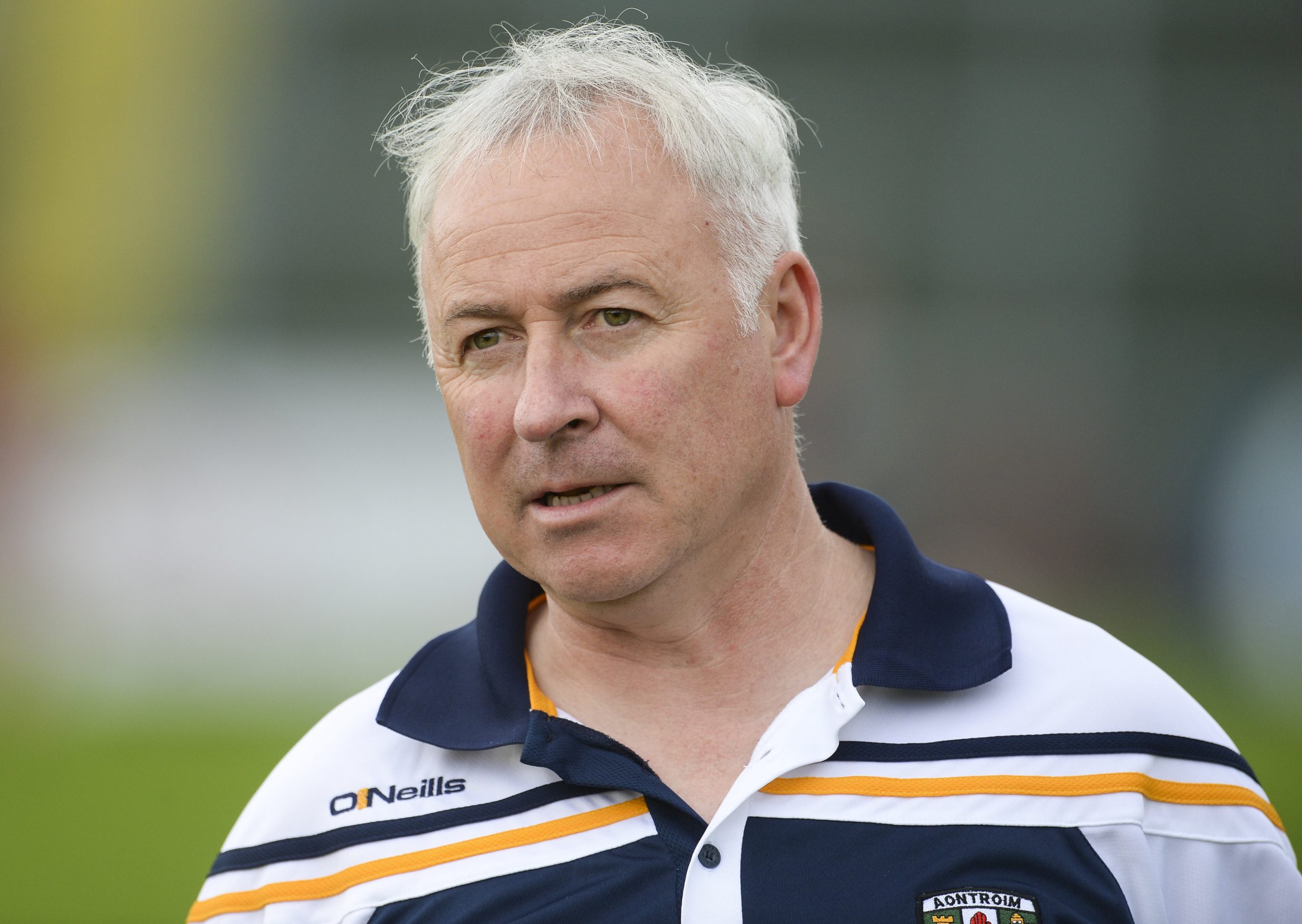Mattie McGleenan and Lenny Harbinson open up on the demanding world of intercounty management, in conversation with Niall Gartland.
LAST month on a blissful Saturday afternoon in Galbally, Eglish u-14s claimed a 7-11 to a 4-13 victory over Fintona to complete a memorable league and championship double.
The strapping man patrolling the sidelines was instantly recognisable — Mattie McGleenan, former Tyrone star and Eglish to the core. To paraphrase Peter Canavan’s All-Ireland winning speech of 2003, there was probably nowhere else in the world that Mattie would have preferred to have been that day.
For him, managing the Eglish u-14s is just as rewarding as the biggest gig of his career – a two-year stint in charge of the Cavan footballers. In his second and final year in charge, 2018, he led the team back to Division One football before they bowed out of the championship with a three-point Qualifier defeat to Tyrone at Brewster Park. Not a bad state of affairs, but he made the decision to draw a line under it and moved on.
There’s a comparison to be made with last week’s news that Raymond Galligan has decided to sign out after two years in charge of the Breffni footballers, citing work and family commitments.
And there’s plenty of other vacancies on the intercounty circuit at the moment, and it’s hard not to wonder whether it’s all becoming a bit unsustainable.
Mattie McGleenan doesn’t rule out a return to intercounty management one day, but he knows as well as anyone, that it’s one hell of a commitment.
“The average backroom team these days is about 20 to 25 people. You have to manage two teams, you’ve a backroom team to coordinate, and a football team to coordinate. It’s clearly a full-time operation.
“The old saying goes that the pressure is a privilege, but it can only be a privilege if you actually have the time.
“I’m a teacher and when I was over Cavan, I’d leave school around 4.30pm and be back around midnight – and that was on a good night.”
Complicating matters was Cavan’s Dublin-based contingent. The decision was made to go to them, in so far as was possible, rather than vice-versa. Another time-sink but it seemed like the most equitable solution.
McGleenan said: “Rather than expecting those players who worked in Dublin to take a two-hour journey and come to us, and maybe even longer when you consider the time it takes to get out of Dublin, we decided to divvy up the training and cut the amount of travel they were doing.
“So a normal week for me at that stage was on a Monday I’d go to Dublin to oversee strength and conditioning with those players. On Tuesday I was in Cavan for training, On Wednesday night I’d meet the other lads in Cavan for S&C. On Thursday night was training again, On Friday was video analysis, and then Saturday morning was team preparation for the game that weekend.
“Players from Tyrone and Derry are relatively blessed in that they usually don’t have far to go to Garvaghey or Owenbeg, but around 10 to 12 Cavan lads worked in Dublin, so it was nearly a half-way split.
“We used to meet in Abbotstown for S&C, and I remember there were lads from Sligo and Leitrim there before us as well.”
He harbours extremely fond memories of his time at Cavan, but ultimately two seasons at the coalface was quite enough. Eight years on, it seems like the time demands have intensified even further, and that only the select few have enough time on their hands to lead an intercounty operation.
“It’s a full-time job and I was lucky to have a very supportive county board. I had great people around me. You have a certain pool of teams with aspirations of provincial and All-Ireland titles and all those teams require a full-time approach. Even since my time at Cavan, things have transformed, there’s so much extra scrutiny with social media and things like that.
“It’s a privilege to be an intercounty manager and I loved the two years but I don’t think it was sustainable in terms of my own health and well-being considering I was balancing it with my profession.
“I don’t know how the likes of Feargal Logan and Brian Dooher managed to combine everything with Tyrone. It’s basically impossible to give 100 per cent to everything, and eventually something has to give.”
That said, he doesn’t rule out a return some day to intercounty management. His love of coaching burns as strongly as ever, but again, the commitment levels are massive.
“I wouldn’t write off the idea, if the opportunity of coming back to intercounty management arose, because it’s the place to be – the environment is amazing and I loved every minute of it.
“In my first game over Cavan, Dublin came to Breffni Park and 18,000 people showed up.
“What I love doing in this life is coaching, whether it’s the Eglish u-14s, the Eglish seniors, Scotstown or Cavan. I’m all-in and it’s the same with every team I’ve taken.
“There were some amazing experiences, we beat Mayo in Mayo, we drew with Kerry, but the difficulty is that you’re basically organising a massive team of people and you need to have the time. The top managers are getting up on a Monday morning and analysing videos and that’s just not feasible for most people.”
LENNY Harbinson was a natural fit for the Antrim job when the position came open in late 2017. A former Saffron player who led St Gall’s to All-Ireland glory in 2010, he had impeccable managerial credentials and was offered a three-year term at the helm.
Three seasons on, he stepped down of his own volition. Like McGleenan, he’d enjoyed his time at the helm, but also like McGleenan, he found it basically all-consuming and enough was enough.
In a sense, it was akin to being a managing director of a small company.
“In terms of the backroom, you’re talking about 15 to 20 people. I kept things fairly tight in terms of having an inner circle of five or six people, but that was my choice, it wasn’t because of financial restrictions. For example I’d one guy who did both operational and statistical stuff and he was brilliant. He essentially double-jobbed whereas other counties would have dedicate people doing both.
“So that’s one team you have to manage and then you get into the players group. You’ll have about 36 players, and that’s possibly slightly extended and you might have a couple of younger lads you’re trying to nurture for selection down the line.
“You’ll have a leadership group of three or four lads within that playing group, and you’re liaising right across the board between your own management team, that leadership group, and then chatting to other lads in your day-to-day training sessions. For example, there’d be lads you’re pulling aside and having a chat about tweaks to their game and things like that, so you’re talking about communication with the best part of 50 people.”
Harbinson has an intensive day job with BT but he was savvy enough to know that players expect a full-time commitment from their managers.
“You still have to be first off the pitch at training and last off it. The expectation from players is that everything’s run like clockwork, almost like a military operation, that everything’s lined up for them. You have your training days, S&C, video reviews, and it’s more or less a full-time job.
“That adds up to four or five days and as a manager you’re central to everything so you can’t just switch off – even on other days you’ll have players phoning you up about one thing or another, so it’s a massive part of your life seven days a week.”
Another reason why intercounty gigs aren’t for everyone is the inevitable criticism that follows on social media in particular. Harbinson says that supporters sometimes suffered from unrealistic expectations and that’s part of the problem.
“There’s maybe a view from Joe public that well, managers are being paid so if he’s taking the money, he can take the criticism.
“I remember saying to the players to try and stay off social media, both in terms of making comments and looking at comments.
“One lad was on the panel, he was going well with his club but wasn’t really playing well for the county, and one of his teammates drew my attention to comments on social media. I had a look at it, and they were cutting him right, left and centre. I spoke to him at training and said, ‘don’t be looking at it as it’ll be you this week and someone else the following week.’
“That’s one of the negative parts of the job but there’s plenty of good things as well. It’s very time consuming but it’s rewarding being involved with young people who are trying to better themselves and do something for their county.
“When I look back at my own playing days with Antrim, we were either in Division 2A or 2B, which was basically Division Three and Four in old money. We floated between Division 2A and 2B for most of our playing days, and it’s the same these days, we toggled between Division Three and Four.
“The reality is, when was the last time we did something meaningful at minor or u-20 level? Yet some of our supporters seem to think it should be straightforward to stay out of Division Four.”
There’s also pressure that comes from within, particularly from disgruntled players who believe they’re getting a raw deal when it comes to game-time.
“One of the problems with Division Three and Four teams is a massive turnover of players year-in year-out for all sorts of reasons,” Harbinson added.
“Some guys want to go travelling, and some drop off because they’re not getting the game-time they want. They’re probably going home to mammy and daddy who are saying ‘you’re better than such and such player and should be playing.’ It’s inevitable that one or two players will drop out in the middle of the season because they don’t believe they’re getting a fair crack at it.”
GAA President Jarlath Burns has floated the idea of potential ‘contracts’ for intercounty managers due to the full-time nature of the role. It’s a thorny enough subject matter, but Harbinson says the reality is that most managers are already being paid.
“You can call it what you want, over the table, under the table, expenses, but the reality is most of the managers at top clubs and at counties are all getting paid.
“But you have to bear in mind that these managers are running a mini-enterprise and dealing with so many backroom members and players, including players outside the match-day panel who are possibly disgruntled because they see no chance of getting on, and you’re trying to keep them happy as well.
“There’s a lot of work to be done and players expect the best. Players are going to universities for example and they’re hearing what’s going on in other clubs and counties, and if things aren’t up to scratch, they’re wondering ‘what’s the point because this club or county is doing this and that and we’re not’ or ‘we don’t have those level of resources’.”
Harbinson stepped down at the end of the 2020 season, a particularly frustrating year given Covid-19 and all that entailed.
“That year wasn’t enjoyable. We had beaten Limerick well up in Portglenone and we were due to play Wicklow the following week in Portglenone.
“The whole momentum was with us but the following week everything was cancelled because of Covid and it remained like that for about six months. There were limited games and people weren’t allowed in stadiums and you had to travel in your own car. It was a bit of a mess.
“Restrictions were eventually eased, there was a lot of chat about teams breaching rules while we followed the rules to the letter and there was a bit of frustration about that.
“We needed to win our last game and hope that Sligo would beat or draw with Limerick, but our opponents Waterford said they weren’t travelling up north. We went back and said hold on a second, we travelled to Wicklow last week to play. I didn’t want to just take the two points, we said we’ll play mid-way, so they agreed to that and we ended up winning that game, but Limerick beat Sligo so we missed out on promotion. The whole thing was a bit of a sickener and I said you know what, I’m stepping away here, and that was it.”
Receive quality journalism wherever you are, on any device. Keep up to date from the comfort of your own home with a digital subscription.
Any time | Any place | Anywhere















